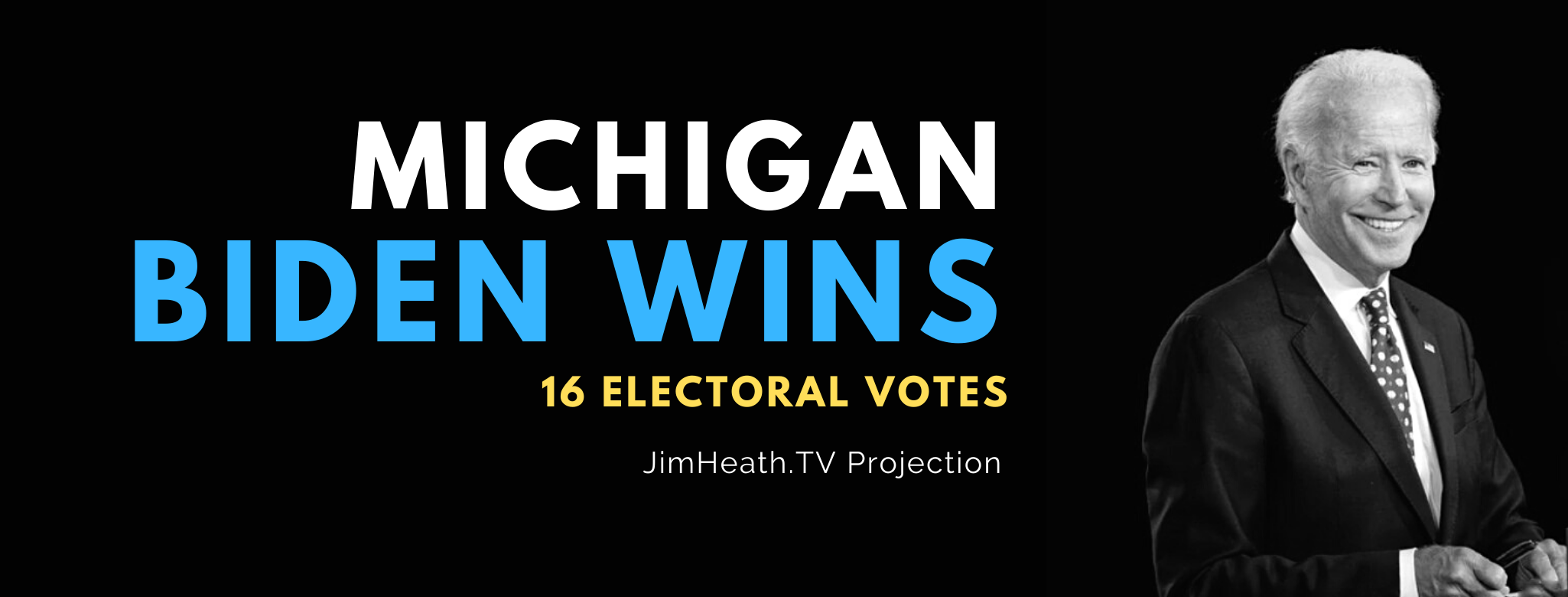Inside Detroit’s absentee-ballot-counting center, one Republican poll watcher complained that workers were wearing Black Lives Matter gear.
She thought one of them — a “man of intimidating size” — had followed her too closely.
Another Republican poll watcher complained about the public address system.
Workers were using it to make announcements.
It was loud.
“This was very distracting to those of us trying to concentrate,” he said.
A third poll watcher noticed that when absentee ballots came in from military personnel, many showed votes for Democrats.
He found that odd.
“I can estimate that at least 80% of military ballots I saw were straight ticket Democrat or simply had Joe Biden’s name filled in on them,” the man wrote. “I had always been told that military people tended to be conservative, so this stuck out to me.”
On Wednesday, President Trump’s campaign asked a federal judge to take a drastic step: block the state of Michigan from certifying the results of its presidential election.
President-elect Joe Biden now leads Trump by about 148,000 votes there.
To back up that lawsuit, Trump’s campaign had promised “shocking” evidence of misconduct.
Instead, the campaign produced 238 pages of affidavits from Republican poll watchers across Michigan containing no evidence of significant fraud but rather allegations about ballot-counting procedures that state workers have already debunked — and in some cases, complaints about rude behavior or unpleasant looks from poll workers or Democratic poll watchers.
“I felt intimidated by union people who were staring at me,” one GOP poll watcher wrote.
The suit in Michigan is emblematic of the problem facing Trump as he seeks to reverse a sizable electoral defeat through long-shot lawsuits.
To work in court, this strategy would probably require Trump to provide evidence of wide-scale voter fraud across multiple states.
So far, despite days of looking and offers of cash rewards from Trump allies, he hasn’t produced it.
In Texas, the lieutenant governor has offered a $1 million reward for evidence of voter fraud. In Arizona, the state GOP is promoting a website for voters to report problems.
“This is an effort to find a problem when one does not exist,” Roopali Desai, an attorney for Arizona Secretary of State Katie Hobbs (D), said in a court hearing in Arizona on Monday.
For the Trump campaign, the biggest problem with these affidavits might be that they raise questions with only a small number of ballots: a few hundred at most, from The Washington Post’s analysis, far less than the number by which Trump trails in Michigan.
Wednesday’s lawsuit in Michigan was similarly touted by Trump’s staff.
They said it would offer more than 230 pages of sworn statements from more than 100 people who observed ballot-counting problems and other irregularities that called into question the integrity of the election.
“These are real, and anyone who cares about transparency and integrity of the system should want this to proceed to the discovery phase,” said Kayleigh McEnany — now doing double duty as a spokeswoman for the White House and Trump’s campaign — on Fox News late Tuesday.
But when The Washington Post reviewed the affidavits Wednesday, they appeared to be a grab bag of statements from GOP poll watchers all over the state.
The poll watchers were Republicans who received some brief training — one woman estimated it took 20 minutes — and then were allowed to observe Detroit election workers processing and tabulating mail-in ballots.
While the poll watchers came from around Michigan, nearly all of their complaints dealt with practices inside the TCF Center, the convention center where ballots from majority-Black Detroit were tallied.
Jacqueline Zaplitny, whose affidavit cited workers wearing Black Lives Matter gear, said that she filed the document after the Michigan Republican Party and the Trump campaign encouraged observers who saw anything out of the ordinary to step forward with their complaints.
She said she believes ballots in Michigan should be recounted. “There are a lot of inaccuracies,” she said.
She said since her affidavit became public, her Facebook page has been filled with people calling her a racist.
“I am not a racist at all,” she said, noting that she raised the concern about the clothing because she felt it was a “double standard” when campaign gear was not allowed.
Some of the affidavits came from people who did not appear to have seen any ballots.
One man was arrested before he even got in the ballot-counting room.
“I put my foot in the doorway,” wrote James P. Frego, a GOP poll watcher, recounting his dispute with Detroit police officers who would not allow him in, saying there were enough GOP poll watchers in the room already. “He insisted I remove my foot and I insisted I would do it as soon as I received an exact COUNT of the number of challengers inside the room itself.”
Frego said officers handcuffed him, put him in a patrol car and gave him a misdemeanor citation for disturbing the peace. “At no time did I swear at the officers,” he wrote in his affidavit.
Others described interactions that — while tense and unpleasant — did not indicate any problems with ballots.
One Chinese American woman said she was told “you are not American.”
Another said she had been told, “Go back to the suburbs, Karen,” by a Democratic poll watcher.
Others complained that while inside the ballot-counting room, they were not allowed to speak with front-line election workers, or were required to stay six feet away from them because of coronavirus protocols.
That often left them guessing about what they had seen and complaining about being unable to look more closely.
They often seemed hampered by a lack of knowledge about Michigan’s election system.
One challenger noted with concern that a group of absentee ballots “appeared in pristine condition, as if they had never gone through the U.S. Postal Service.”
Michigan allows voters to drop off absentee ballots in drop boxes or at clerks’ offices, avoiding the mail, although it is not clear the circumstances around those ballots.
The poll watchers’ most common concerns centered on two practices that the city of Detroit has said are legal and common.
Many poll watchers, for instance, raised concerns that they saw clerks entering numerous voters’ dates of birth into a computer system as Jan. 1, 1900.
The city of Detroit, in legal filings in another lawsuit, has said that is not an indication of fraud.
It said that absentee ballot clerks do not have access to voters’ birth dates but that they use a system that sometimes requires them to enter a date anyway.
So, the city says, clerks are told to enter 1/1/1900 as a placeholder.
“This is not a legal requirement but essentially a quirk in the design of the software,” lawyers for the city wrote in a legal filing Wednesday.
In other cases, poll watchers raised questions about the ballot “duplication” process, which occurs when the machines spit out a ballot as unreadable.
Election workers are allowed to duplicate the ballot — making all the same choices — and run the new one instead.
Poll watchers complained that they had been kept out of that process.
The city, however, said that poll watchers aren’t supposed to be part of that process.
They said the ballot duplication was done properly.
Source: The Washington Post


